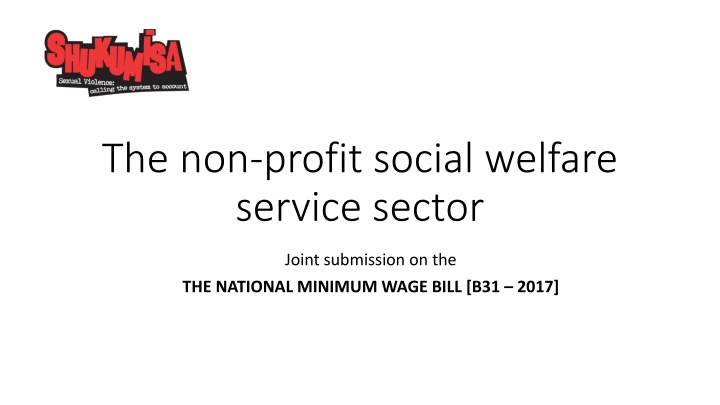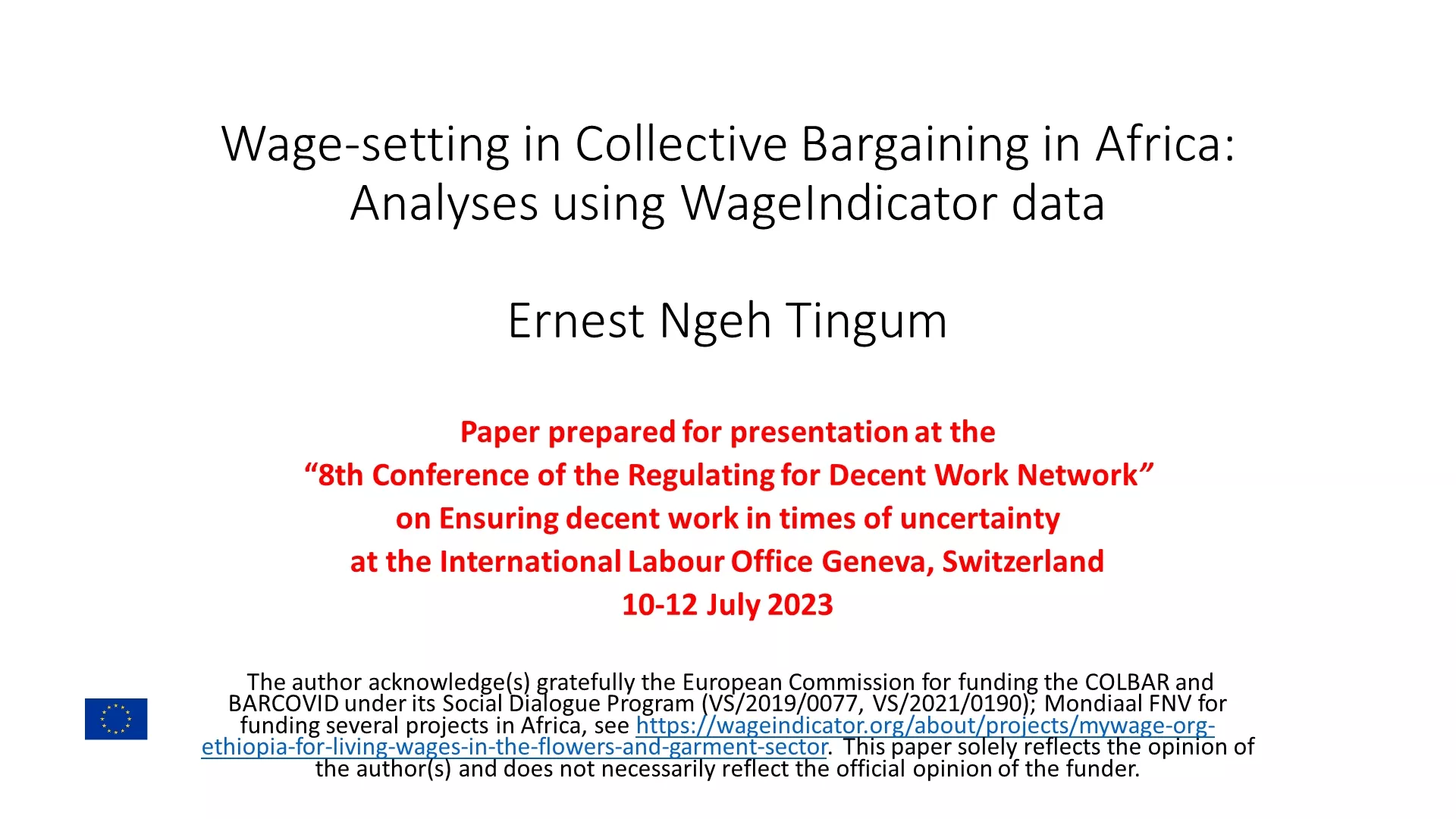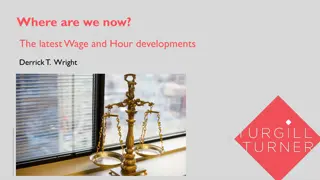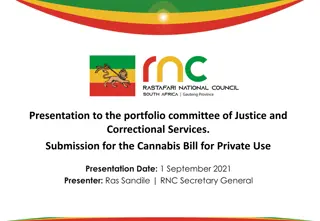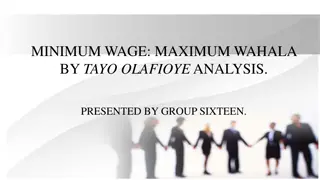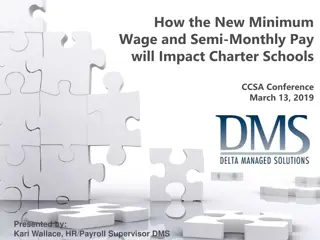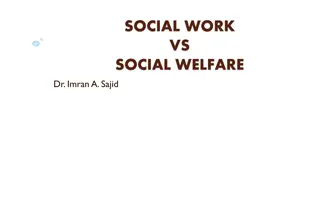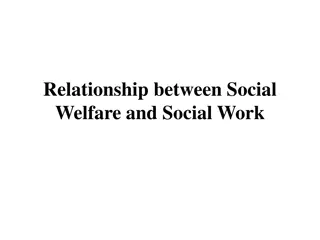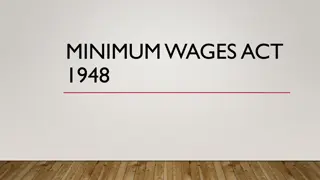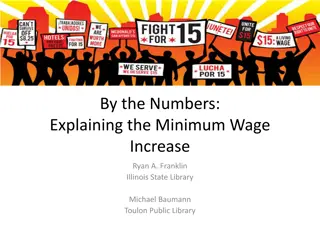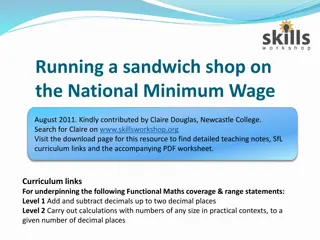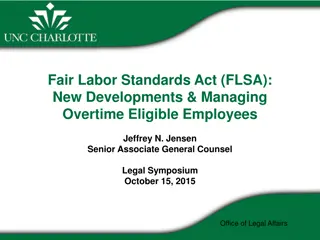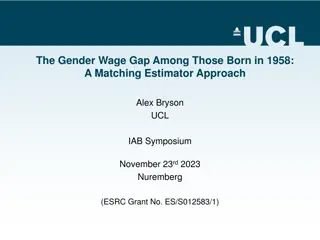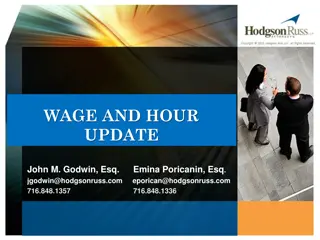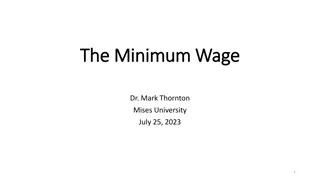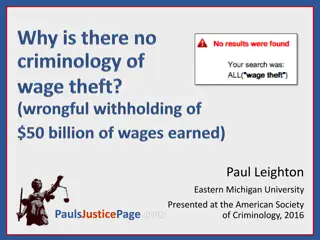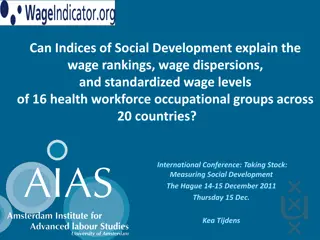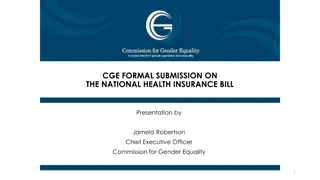Joint Submission on the National Minimum Wage Bill by Social Welfare Sector
Representation of over 1,500 non-profit organizations providing various social welfare services, expressing support for the minimum wage bill but highlighting challenges in financing. Describes the funding structure of non-profit services and the inadequacy of subsidies received from the Department of Social Development, leading to difficulties in meeting costs.
Download Presentation

Please find below an Image/Link to download the presentation.
The content on the website is provided AS IS for your information and personal use only. It may not be sold, licensed, or shared on other websites without obtaining consent from the author.If you encounter any issues during the download, it is possible that the publisher has removed the file from their server.
You are allowed to download the files provided on this website for personal or commercial use, subject to the condition that they are used lawfully. All files are the property of their respective owners.
The content on the website is provided AS IS for your information and personal use only. It may not be sold, licensed, or shared on other websites without obtaining consent from the author.
E N D
Presentation Transcript
The non-profit social welfare service sector Joint submission on the THE NATIONAL MINIMUM WAGE BILL [B31 2017]
Who this submission represents: The Shukumisa Coalition, working in collaboration with the Vhembe Civil Society Network, the National Shelter Movement, the National Coalition of Social Services, the KwaZulu-Natal Welfare, Social Services and Development Forum, and the South African Federation for Mental Health. Represents the views of over 1 500 non-profit organisations (NPO) providing post-rape and other related care, domestic violence shelter services, child protection services, residential facilities for older persons and people with disabilities, child and youth care centres, victim empowerment services and other forms of social welfare services nationally. Are all currently receiving, or have received subsidies from Department of Social Development (DSD)
Our position on the Bill: The non-profit social welfare/care sector was recognised by the National Minimum Wage Panel as one of three categories of vulnerable worker. (The other two categories are domestic workers and farm and forestry workers.) We welcome the introduction of a minimum wage. Many of our organisations will not be able to pay it due to the ways in which the financing of non-profit social welfare/care services is structured. In its current form the Bill does not take this financing structure into account
How non-profit services are funded: Historically, social welfare services provided through partnerships between the state and the non-profit private sector (including faith-based organisations). This partnership takes concrete form in the money allocated by the DSD towards the provision of social welfare services by the non-profit sector. This financial assistance takes the form of a subsidy. It is only a partial payment of the full cost of the service because it is expected that NPOs will source the balance of their costs elsewhere. These additional sources of funding may include other government departments; donor organisations; corporate social responsibility programmes from the private business sector; trusts and foundations; and the proceeds from lotteries.
A small number of NPOs with national offices are funded by the national office of the DSD The provincial departments of social development bear the primary responsibility for subsidising NPOs based in that province. The number of NPOs subsidised by provinces is far larger than the number funded by the national department. The size of the subsidy is at the discretion of the province, rather than standardised through national policy. This results in considerable variation in the amounts paid to organisations both within the same province, as well as in different provinces. In virtually all cases the subsidies are inadequate to meeting the full cost of the service and have not kept pace with inflation.
The three types of subsidy: Post subsidies cover part of the costs of a particular category of worker. Social worker posts in 2016/17 varied between as little as R5 415/month in the North West Province, to as much as R14 536/month in the Western Cape. Eastern Cape, for example, social auxiliary workers receive a post subsidy of R2 981 per month. This amount has not been increased since 2005 and is now below the March 2018 minimum monthly wage for farm and forestry workers R3 169.19. In Gauteng the lowest subsidy in 2016/17 for an auxiliary social worker was R8 060 per month. Subsidies paid to staff without formal qualifications are even lower: R1 250/month for counsellors providing post-rape care based in the Thuthuzela Care Centres R2 500/month for house mothers in domestic violence shelters.
Programme subsidies partially fund the delivery of a service itself. in 2016/17 a domestic violence shelter in the Free State was provided with approximately R256 858 to run its shelter programme for the year. This amount was intended to cover staff salaries, rent, administration and communication, as well as shelter residents food and other needs including those of their children. 1 part-time social work post and other staff allocated stipends of R600/month (housed 182 adults and 52 children over a 12-month period)
Service delivery subsidies are usually based on the number of beneficiaries the NPO delivers a service to. In 2010 R4 000,00 per child per month was the accepted cost of caring for a child in a child and youth care centre. The costing of the Children s Act by the national DSD however, set this amount higher at R6 000,00 per child per month. Two child and youth care centres managed by the Free State DSD spent R5 000,00 and R6 750,00 per child per month. Subsidies for the 2011/2012 financial year to NPO child and youth care centres amounted to R2 091,00 per child per month. One NPO which could not obtain additional funding was forced to provide three very basic meals per day with a budget of just R11,84 per child per day, when at least R50,00 per child per day was needed. Shelters for street children and children in difficult circumstances received a subsidy of between R400,00 to R500,00 per child per month. The Free State DSD acknowledged that at least R2 000,00 per child per month was needed.
National Association of Welfare Organisations and Non National Association of Welfare Organisations and Non- - Governmental Organisations and Others v MEC for Social Governmental Organisations and Others v MEC for Social Development, Free State and Others (1719/2010) Development, Free State and Others (1719/2010) ( NAWONGO ) ( NAWONGO ) Series of four decisions handed down by Free State High Court between 2010 and 2014. Subsidies are substantially inadequate the DSD ordered to develop a reasonable funding policy. The DSD s existing funding policy (which is still in place) fails to recognise as a fundamental principle of funding that non-profit organisations that care for children, older persons or vulnerable persons in need or provide statutory services, fulfil the obligations of [government]. Therefore they cannot be funded in ways that result in inferior services.
Cont. The DSD did not dispute that sourcing additional funds had become increasingly difficult for NPOs. The final NAWONGO judgment therefore approved a draft policy that provided for subsidies based on the full core costs of delivering services if NPOs had not been able to obtain additional funds.
The DSD budget 88% of the total Budget for the DSD goes towards grants 10% goes towards social services. The budget for social services has been further diminished by a decade s worth of above-inflation increases to the public sector. By 2018 the NAWONGO decision had still not been implemented in the Free State let alone nationally. An increase in the equitable share arising from the NAWONGO decision is only slated for 2019/20.
The consequences: Organisation A currently employs 13 child and youth care workers (CYCW) who earn between R2 400 and R3 000 per month. Given its financial situation, there is no possibility of Organization A paying its CYCWs more. Cannot afford to retrench any of the CYCW because the Norms and Standards as they apply to Chapter 13 of the Children s Act, which registers their service, requires a specified ratio of CYCW to be on duty for a set number of children. If Organisation A retrenches some of its CYCWs, in order to pay the remaining CYCW the minimum wage, it would be in violation of the very Act which makes provision for the service it offers. Given that children in CYCCs are wards of the state, there is a strong legal obligation to provide properly for them.
Organisation B all 32 of its affiliate organisations will be affected. The number of workers being paid less than the minimum national wage is 330. If their salaries increased in accordance with the NMW Bill, the additional cost per month would be R420 000 or R5 million for the year. They will not be able to continue with many of the projects and activities currently serving its vulnerable population groups. The organisation has not been able to increase any staff salaries in the past two years.
Organisation C has received the same subsidy of R 2 981.25 per month for its social auxiliary worker since 2005 - no increase for 12 years. At the request of the DSD, the organization is also administering the funds of a NPO running a daycare centre providing ECD. All the staff at the centre work on a full-time basis. DSD knows this but treats them as volunteers. They receive stipends of R2 000 per month for each of their staff including the centre s director. Although they are expected to charge parents a fee, this is unrealistic, given that majority of parents are unemployed or low-income earners.
Organisation D has 1 135 employees below the minimum wage or 41% of its workforce. If it were to pay each employee the proposed minimum wage, it would require an additional R506 965.98 per month, and R6 083 555.76 per year. Organisation D does not have access to this amount of money and will in all likelihood have to close its facilities or retrench between 25% and 30% of its lowest-level employees who need their jobs the most.
Organisation E assists people with mental disabilities. One of their services is a youth skills development centre (or protective workshop ). The DSD regards those who attend the centre as beneficiaries and provides a service delivery subsidy of R200/person per month. The Department of Labour considers this group of people to be employees and has indicated to Organisation E (as well as other organisations providing similar services to people with disabilities) that they expect NPOs to pay the minimum wage those who attend these programmes. This contradictory understanding of the status of people with disabilities who attend skills centres (or protective workshops) means that the organization is expected by the Department of Labour to add over 100 people to their wage bill for whom they only receive a subsidy of R200 each per month from the DSD.
Recommendations The minimum wage is being introduced by one section of government the Department of Labour at a point when it has been recognized by the courts, the DSD and National Treasury that funding to NPOs is inadequate and where no funds are immediately available to address this. As non- profit entities serving society s most vulnerable and poor members, organisations obviously cannot address this by charging for their services. Nor can they compel donor organisations, corporate social responsibility programmes, or trusts and foundations to fund them all to the extent where they can pay the minimum wage. The National Lottery Commission s new funding policy also does not allow for an organization to be funded for two years in a row taking away another source of funding for many organisations.
The EPWP sector It is NOT appropriate to locate this sector in the EPWP Some subsidies are already below the EPWP If existing staff are redesignated EPWP employees this may result in unfair labour practices (ie lower pay and job grade) People in this sector are not unskilled EPWP funding is volatile and unpredictable changes. Services must be consistently available at the same quality if they are to benefit those who need them.
Cont. The Bill has made provision for domestic workers and farm and forestry workers. In relation to the welfare and care work sector the Panel wrote the following: A large number of workers, mainly female workers, are employed in welfare and care work, at low wage levels. At least some of this work is undertaken on behalf of Government, and the low wages are partly a result of low levels of Government subsidy. The Panel believes that an expert group should address the challenges in this sector. This expert group has not been established.
Cont. Urgently convene the expert group to include NPOs, representatives of the DSD and Treasury. This group must calculate the cost of increasing all DSD subsidies currently below the minimum wage to the amount proposed by the Bill and plan how this will be phased in. In addition, we recommend that a temporary exemption be applied to the sector while the expert group completes its work.Ask Parliamewnt to have this committed to in writing by DoL, Treasury, DSD and DoH along with time frames. Must be in place before the legislation enacted. Crude example of the possible extent of increases: PAIA request to EC DSD revealed 1 720 ECD centres. According to one of the ECD centres who contributed to the submission no employee receives more then R2 000/month
Resolve the different understandings of an employee, beneficiary and volunteer held by the Department of Labour and the DSD. If both categories are to be defined as employees, then subsidies must be adjusted accordingly. The proposed Minimum Wage Commission does not allow for the representation of the NPO social welfare sector. It is crucial that the Bill be amended to recognize and include this sector so that their particular work circumstances are adequately taken into account when decisions are made that affect their wages, employment and working conditions.
